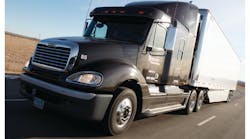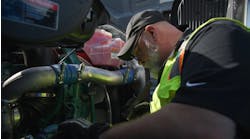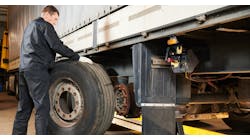Survival in the fiercely competitive trucking industry takes a resolute spirit and the willingness to try new things. Barry Lesmeister, owner of Lesmeister Transportation in Bismarck, ND - a company that hauls products for the beverage and general commodities industries across the northern United States, has both. He says his competitive drive motivates him to keep abreast of new products and services that he might incorporate into his operation to be more profitable.
One area of focus has been on heavy duty specialized lubricants for commercial vehicles, with an eye toward motor oils and greases that can help maximize the life of his equipment - 25 tractors and 40 trailers - that have to endure the long, brutal winters in North Dakota. Lesmeister began looking into using synthetic lubricants because of the performance advantages they offer compared to conventional mineral-based lubes, including enhanced protection under all operating conditions.
Years ago, the company began using Mobil Delvac 1300 Super 15W-40 conventional oils in its trucks. This extra-high performance, diesel engine oil was designed to help extend engine life, provide enhanced wear protection and oxidation resistance, even under severe conditions. "We had good results," says Lesmeister.
ADDED PROTECTION
Afterward, the fleet then switched to Mobil-branded synthetic products for the differentials, gearboxes and transmissions in order to get added protection for the trucks. In some instances, synthetic greases are superior to conventional petroleum-based oils in their ability to resist breakdown from mechanical and thermal conditions.
The synthetic benefits Lesmeister Transportation saw under the hood encouraged the company to begin using Mobilith SHC 007 synthetic grease in the non-driven wheel ends of the company trailers. The grease is a high-performance product scientifically engineered to exceed the demanding requirements for severe applications at extreme temperatures. Before the switch, Lesmeister technicians were changing the grease at every brake job. Now, with Mobilith SHC 007, they change the grease every fourth brake job, saving the company close to $4,000 per year in parts and labor costs.
"We were amazed at how well the synthetics performed, and right away we knew the next obvious step was to start running synthetic in the engine compartments across the fleet," he says.
KNOWLEDGE QUEST
Soon, Lesmeister was meeting with his longtime Mobil distributor, Farstad Oil, to discuss the benefits of switching the fleet to synthetic engine oil.
"Many of our customers have a lot of success with the synthetics up here in North Dakota, so for us and Barry, this was a no-brainer," says Kirby Mueller, lube oil general manager at Farstad Oil, a family-operated wholesale petroleum products distributor based in Minot, ND. "We worked closely with Barry and his team to review the performance and economic benefits he would see from upgrading the entire fleet to running synthetics in the engine compartments."
In their discussions it was noted that synthetic lubricants resist degradation at high temperatures better than conventional oils, leading to longer oil life and reduced deposits, sludge and varnish formation. At low temperatures, synthetic lubricants flow better than conventional oils, allowing them to reach components faster in order to provide quicker and better protection against wear.
It was also noted that synthetic lubricants are more efficient than conventional oils, leading to lower friction during operation. This lower friction can be seen in improved fuel economy and lower operating temperatures, particularly in axle and transmission applications. In addition, many equipment builders endorse extended oil drain intervals when properly approved synthetic oils are used.
The people at Farstad Oil recommended that Lesmeister Transportation go with Mobil Delvac 1 ESP 5W-40 - a fully synthetic, "supreme performance," heavy duty diesel engine oil that helps extend engine life while providing long drain capability and potential fuel economy savings for modern diesel engines operating in severe applications. The fleet began testing the oil. It ran the oil in five tractors over a two-year period and compared the performance results to the two years prior to switching from a conventional heavy duty diesel engine oil. The five rigs were on the same routes with the same drivers as they had been prior to converting.
Pleased with the test results of the synthetic motor oil, Lesmeister Transportation made the transition to a fully synthetic fleet. The process to convert the entire fleet took less time and was less complex than Lesmeister had anticipated.
BEYOND PROJECTIONS
One of the most obvious benefits of switching to Mobil Delvac synthetics is the extended oil drain interval, which helps reduce the fleet's oil consumption and service downtime - and costs, Lesmeister says.
"In terms of total cost savings over the past 10 years (when the switch was made), I estimate we have easily saved more than half a million dollars," he says. "We aren't buying as much oil as we previously were because of the extended oil drains," adds his wife Mary, the company's treasurer. "At the same time, we are achieving increased fuel economy savings, which obviously impacts our bottom line. And, we are creating less waste oil."
The other obvious benefit, Lesmeister notes, is the performance and protection the fleet gets during cold starts.
"Since Barry switched our fleet over to the synthetic Mobil Delvac 1, my job has been a lot easier," says Bob Morris, Lesmeister's shop foreman and lead mechanic for more than 20 years. "Our trucks always start in the morning, whether they are here in our lot plugged into heaters, or at truck stops totally exposed to the elements."
All vehicle maintenance is done in-house except for major warranty work at the company's own maintenance facility.
As a small business owner, Lesmeister says there is another benefit to his all synthetic lubes fleet, but this one is that is hard to put a price tag on: peace of mind. "You're always going to have challenges as a business owner," he says. "But knowing that our trucks and our drivers are well protected with Mobil Delvac 1 synthetic oils is something that gives me a lot of confidence and peace of mind."
For him and his wife, the belief in synthetic oils extends beyond their trucking business. They run only Mobil synthetic oil in their personal vehicles.
In his 40 years of trucking, Lesmeister has made plenty of decisions. Judging from his success today, most of them have been smart. "One of the best decisions I have ever made was upgrading our entire fleet to Mobil Delvac 1 synthetic oils. "It was 10 years ago when we made this decision, and it continues to pay off for us every day."




